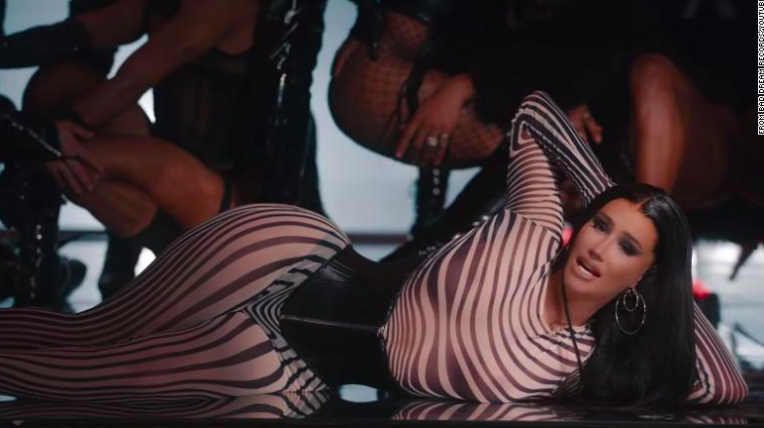When celebrities who harness a substantial platform start switching up their appearance drastically (Iggy Azalea for one) the internet society is quick to jump on the bandwagon of opinions.
While we are currently living in a more liberal time where people are told they have more freedom to express themselves, there comes a point where we as a society do need to consider: where do we draw the line of expression of the ‘self’ when that ‘self’ is embodying cultural appropriation?
And further, when is it cultural appropriation and when is it celebration of another culture?
Recently, rapper Iggy Azalea, real name Amethyst Amelia Kelly, portrayed a look in her latest music video which has caused a hotbed of contestation. The overarching topic of said contestation is ‘Blackfishing’, a term you may have heard but may not know much about.
Okay wait, what did Iggy Azalea do?
Azalea’s look in her ‘I am the Strip Club’ music video portrayed a strikingly different appearance for the artist. Clothing brand Boohoo shared the image saying Azalea “served” an ‘#iamthestripclub’ look, but many pointed out that the only look Azalea served was ‘Blackfishing’.
Iggy Azalea is serving ?#iamthestripclub pic.twitter.com/7Med9guuEl
— boohoo (@boohoo) July 2, 2021
What is ‘Blackfishing’?
‘Blackfishing’ is a portmanteau of ‘black’ and ‘catfishing’ as Time Magazine explains.
It was a term coined in 2018 by hip hop journalist Wanna Thompson after she posted a tweet that called out examples of white women “cosplaying” as black women on social media. Her viral tweet started serious conversations on black beauty culture being appropriated.
The term describes “a step beyond cultural appropriation when people alter their appearance with makeup, cosmetic surgery, filters or digital editing to appear Black” as per Time.
It’s often accredited to “white public figures, influencers and the like [who] do everything in their power to appear black” Thompson told CNN.
“it’s not a compliment,” the publication adds.
View this post on Instagram
Why is it problematic?
Blackfishing “creates a dangerous paradox by celebrating black beauty and aesthetics- but only when highlighted by white people,” as Thompson explains.
As Time Magazine puts it, there is a “sobering symbol of the exploitation and degradation that black women and their bodies have suffered for centuries.”
Time went on to express that ‘Blackfishing’ plays into a “longtime fascination with the aesthetics of blackness, and an unwillingness to engage with the ugliness of anti-black racism at the same time.”
Essentially, it’s problematic because those copying the black aesthetic are credited for the looks and trends, rather than the actual culture and women who are of that culture.
What Thompson notes is that there is an ownership that is portrayed, that when “white people do it” it is successful and so forth, but when black people embody their own beauty culture, it’s classed differently.
“Intentions are important… it’s about celebrating and drawing back to those cultures, and using your voice to shed light,” Cape {town} Etc’s Jay-Tee Davidson expresses.
Who else has been accused of black fishing?
It’s difficult to talk about ‘Blackfishing’ without thinking of The Kardashians who have attained years of criticism on the matter. These public criticisms have ranged from the afro-visuals that both Kim and Kendall Jenner have showcased in Kim’s 2017 KKW beauty campaign where she was accused of Blackface, and of course her cornrows era. Of course, there’s also Kylie Jenner’s infamous visual that saw her look completely different. Rita Ora is another famously critiqued artist, alongside Bhad Babie who accredits her look choices to “growing up in the hood.”

View this post on Instagram
— Kim Kardashian West (@KimKardashian) June 17, 2018
But aren’t they just celebrating those looks?
Here’s where the problem comes in. We can’t celebrate afros on Kim Kardashian as a society and still allow black girls to be considered “unkempt” for wearing their natural hair to school, work or in their everyday lives. Zozi Tunzi made a huge statement by wearing her natural hair when she became Miss Universe in 2019, and the reason it was a statement was because of how many black girls, especially in South Africa are still judged for natural hair.
When is it celebrating?
As Jay-Tee expresses, “I know many many elders that would gladly give you a recipe for a kerrie, braid your hair or share special moments with a white person.” However, we go back to intentions here and a clear distinction needs to be made between capitalizing and celebrating.
The beauty industry has a role too.
In some cases, we also have to consider the creative control that the beauty industry has on how celebrities look. For certain cover shoots, style-looks, etc, for many models it’s not always their decision how they are visualised. In other cases, we can consider how particularly Latina and Black cultures by both being historically marginalized sometimes exchange beauty cultures. Selena Gomez and Interview Mag exemplified this. Many people said it was a case of ‘Blackfishing’, while others said it really wasn’t in relation to her Mexican heritage.
View this post on Instagram
We have so much access to information today and we have the opportunity to access the history of trends we might like. It’s so important to realise that for women living in the social media era, we are shaping how so many girls see themselves. In my opinion, writes Cape {town} Etc’s Ashleigh Nefdt, if you are white, have those conversations with your friends of colour. Ask them when something is appropriation or celebration. The only way forward is to know more.
Picture: Twitter

